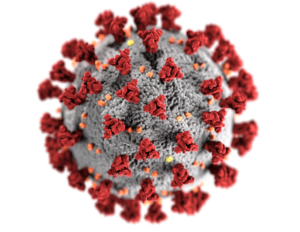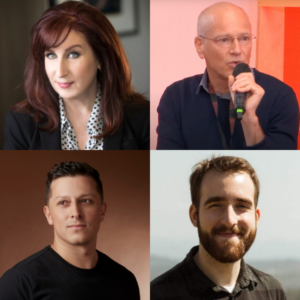
With the arrival of vaccines against COVID-19, journalists, communicators and the fact-checking community around the world have tried their best to cover the vaccination efforts and help the general public understand the current stage of the global pandemic that took hold one year ago.
However, just as with the coronavirus last year, the vaccines have brought their own sets of challenges for reporters and editors needing to explain their development, efficacy, side effects, distribution and more to societies eager for reliable information.
That’s why the Knight Center for Journalism in the Americas is offering the new course, “Covering the COVID-19 vaccine: What journalists need to know,” which will run from March 29 - April 25 2021 and will be offered in English, Spanish, Portuguese and French.
Registration is open, so sign up now!
“This multilingual MOOC will help journalists around the world who are trying to better understand the science behind the vaccines, the rollout and distribution of each vaccine, misinformation surrounding the vaccines, and much more,” said Mallary Tenore, associate director of the Knight Center for Journalism in the Americas. “We’re grateful to be working alongside UNESCO, UNDP, WHO and the EU on this important course, which will feature timely and relevant resources, expert insights, and a robust peer-to-peer learning community.”
This Knight Center course is being held in partnership with UNESCO, the United Nations Development Programme (UNDP), and the World Health Organization (WHO), and co-funded by the European Union.
“The current health crises have required governments and other players to develop and implement what may be some of the most challenging policies ever designed by our societies, this includes the COVID-19 immunization strategies. As is the case with any other policies, though at an unprecedented scale, their efficiency and efficacy is also related to how transparently and responsively these policies are conceived and deployed. Here, the role of journalists as watchdogs of decision makers and policymakers is central,” said Guilherme Canela de Souza Godoi, Chief of the Freedom of Expression and Safety of Journalists Section at UNESCO.
“At the same time, we are also facing an unprecedented wave of disinformation linked to COVID-19. So another key role is expected of independent journalism: a supplier of accurate, verified and timely information to the public sphere. Working with our partners and with funding from the European Union, UNESCO is proud to be co-organising this course to engage journalists in a fundamental dialogue to enhance the capacity of the news media in coping with this challenge,” said Guilherme Canela de Souza Godoi.
“Journalists are key in keeping citizens informed, holding governments accountable for their response to the pandemic, and in providing verified facts on the emergency in times of dis- and misinformation. This MOOC on vaccines against COVID-19 cannot be more timely,” said Stefan Liller, UNDP Resident Representative in Uruguay.
The Massive Open Online Course (MOOC) will be taught by health and science journalist Maryn McKenna, who is also a Senior Fellow at the Center for the Study of Human Health at Emory University. She will be joined by assistant instructors specific to each language. André Biernath, a science journalist for BBC Brazil, will be the assistant instructor in Portuguese; Federico Kukso, a science journalist and author from Argentina, will be the assistant instructor in Spanish; and Yves Sciama, a science journalist from France and vice president of the French Association of Science Journalists, will be the assistant instructor in French
The MOOC will feature video classes with McKenna, complemented by video interviews with guest speakers, reading materials, discussion forums, and quizzes. Guest speakers include coronavirologist Angela Rasmussen, the World Health Organization’s Kate O’Brien, and Deepak Kapur, chairman of the Rotary International’s India National PolioPlus Committee.
The four weekly modules will cover vaccine issues of global relevance:
Covering COVID-19 has become part of every beat in the newsroom and brings its own set of challenges, especially for those new to health and science topics.
 “We are offering this course precisely because the COVID vaccines and vaccination campaigns are challenging!” McKenna said. “There are a lot of aspects that are new, no matter your expertise — for instance, I’m a science journalist, but before this year I never had to think deeply about supply chains logistics. But: Last year, journalists all over the world devoted themselves to gaining new knowledge very rapidly in order to cover all aspects of the pandemic. In year 2, we’re facing a similar challenge with vaccines. But because journalists accomplished this task last year, I am confident they can do it again this year — and we are here to help.”
“We are offering this course precisely because the COVID vaccines and vaccination campaigns are challenging!” McKenna said. “There are a lot of aspects that are new, no matter your expertise — for instance, I’m a science journalist, but before this year I never had to think deeply about supply chains logistics. But: Last year, journalists all over the world devoted themselves to gaining new knowledge very rapidly in order to cover all aspects of the pandemic. In year 2, we’re facing a similar challenge with vaccines. But because journalists accomplished this task last year, I am confident they can do it again this year — and we are here to help.”
To stay up-to-date with the rapidly changing COVID-19 vaccines story, students will have the benefit of discussion forums to interact with McKenna, assistant instructors, and one another.
“The forums are not only social spaces; they also are places where the journalists taking part can share the latest news from their countries and ask for advice from colleagues about how best to approach coverage,” McKenna said.
Like all Knight Center MOOCs, the course is asynchronous, meaning participants can take it in the days and times that best suit them. However, there are recommended weekly deadlines to complete activities so as not to fall behind.
Students who successfully complete course requirements have the option of paying an administrative fee of U.S. $30 to receive a certificate of completion in PDF format. The Knight Center will evaluate the cases of students who need a waiver of that fee. No formal college credit is associated with the certificate.
McKenna will teach the course with support from scientists and other journalists as guest speakers and assistant instructors who are native speakers of Spanish, Portuguese and French.

Course instructors CW from top L: Maryn McKenna, Yves Sciama, Andre Biernath and Federico Kukso
McKenna is a journalist focusing on public health, global health and food policy and is a Senior Fellow at the Center for the Study of Human Health at Emory University, where she teaches health and science writing and narrative. She is the author of the books “Big Chicken: The Incredible Story of How Antibiotics Created Modern Agriculture and Changed the Way the World Eats,” “Superbug” and “Beating Back the Devil.” Her 2015 TED Talk, "What do we do when antibiotics don't work any more?" has been viewed 1.8 million times and translated into 34 languages.
This is the second course related to the pandemic that McKenna has taught for the Knight Center. The first, “Journalism in a pandemic: Covering COVID-19 now and in the future,” took place from May 4 - 31, 2020 and attracted nearly 9,000 students from 162 countries. This project was made possible thanks to support from the Knight Foundation, UNESCO, UNDP and the WHO. Self-directed versions of the course are available in Arabic, English, French, Portuguese, Russian, and Spanish.
Additionally, McKenna moderated a multilingual webinar, “Covering the COVID-19 vaccine: What journalists need to know,” on Jan. 29, 2021, that was held in collaboration with UNESCO and the WHO, with funding from the European Union. The event gave best practices for journalists covering the vaccines, with a focus on vaccine distribution and the science behind the vaccines. Panelists included journalists, health experts and representatives from NGOs. Recordings of the webinar are available in Arabic, Chinese, English, French, Hindi, Portuguese, Russian, and Spanish.
Also, UNESCO and WHO helped the Knight Center compile a robust multilingual resource page for journalists who are covering the vaccines.
Learn more about the MOOC, “Covering the COVID-19 vaccine: What journalists need to know,” here, including how to register. Sign up today for this free course!